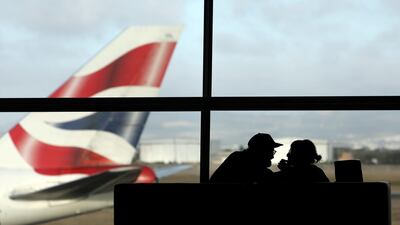While some countries struggle with safety, American aircraft travel has lately had a remarkable safety record; from 2014 through 2017, there were no fatal commercial airline crashes in the United States.
But those years were fraught with other kinds of trouble: security breaches and electronic espionage affected nearly every adult in the US, along with the power grid in Ukraine and the 2016 US presidential campaign, to name a few. As an expert in cybersecurity policy, I think it’s time that my own industry took some lessons from one of the safest high-tech transportation methods of the 21st century.
Like today in cybersecurity, the early days of US air travel weren’t regulated particularly closely. And there were a huge number of accidents. Only after public tragedies struck did changes occur. In 1931, a plane crash in Kansas killed the famous Notre Dame football coach Knute Rockne. And in 1935, US Senator Bronson Cutting of New Mexico died in the Missouri crash of TWA Flight 6. These events helped contribute to the 1938 creation of the first US Air Safety Board. But it took until 1967 for the new Department of Transportation to be created with an independent National Transportation Safety Board (NTSB).
Since then, the NTSB has rigorously investigated all aircraft crashes and other transportation incidents in the US. Its public reports about its findings have informed changes in government regulations, corporate policies and manufacturing standards, making air travel safer in the US and around the world.
As cybersecurity incidents proliferate around the country and the globe, businesses, government agencies and the public shouldn’t wait for an inevitable disaster before investigating, understanding and preventing these failures. Nearly a century after the original Air Commerce Act in 1926, calls, including my own, are mounting for the information industry to take a page from aviation and create a cybersecurity safety board.
The creation of the NTSB was the first independent agency charged with investigating the safety of various transportation systems, from highways and pipelines to railroads and aircraft. Since 1967, the NTSB has investigated more than 130,000 accidents.
These investigations are vital since they help establish “the who, what, where, when, how and [perhaps] why behind an incident”. After the facts are determined, policymakers can back up, and often have backed up, NTSB recommendations with new regulations. Failing that, it is common for air carriers, for example, to voluntarily implement changes it suggests. A similar approach could help improve the internet, a new technology that, like aircraft are, is tying the world closer together even as it threatens our shared security.
Two elements of the NTSB may be particularly useful for enhancing cybersecurity.
First, it separates fact-finding proceedings from any questions of legal liability. Second, these investigations are broad, involving various stakeholders such as manufacturers and airline companies.
______________
Read more:
Vanishing jetliners still possible four years after Malaysia flight 370
WATCH: Etihad breaks world record for fastest Boeing 777 engine change
______________
Cyberspace is similarly made up of a wide range of companies and technologies.
A cybersecurity safety board need not in fact be national. It could begin from the bottom up, with companies partnering together to protect their customers by sharing best practices.
Critics of establishing a cybersecurity safety board would likely contend that the speed at which technologies change makes it difficult for any recommendations, even if they were quickly implemented, to sufficiently protect organisations from cyber attacks. NTSB investigations can take a year or more; to ensure findings were still relevant, cybersecurity inquiries would need to be faster, such as by streamlining cyberforensics and relying on widely used tools such as the National Institute for Standards and Technology Cybersecurity Framework.
Other challenges include standardising terminology across the industry and identifying the right experts to look into data breaches, which might be easier said than done given the talent shortage among cybersecurity professionals. Broad-based cybersecurity educational programmes, such as a new partnership between the law, business and computer science schools at Indiana University, should be encouraged to help address this shortfall.
Additional measures would likely be required to make a cybersecurity safety board successful, such as launching investigations only for serious breaches such as those involving critical infrastructure.
More nations and regions – including the European Union – are imposing stringent requirements on companies that suffer data breaches, including mandatory reporting of cyberattacks within 72 hours and more rigorous preventive measures. Businesses, governments and scholars around the world are working on how to improve data security. If they came together to support a global network of cybersecurity safety boards, their efforts could promote cyberpeace for people and institutions alike.
All that is needed is the will to act, the desire to experiment with new models of cybersecurity governance and the recognition that we should learn from history. As the late president Franklin D Roosevelt once famously said: “It is common sense to take a method and try it: if it fails, admit it frankly and try another. But above all, try something.”
Associated Press

